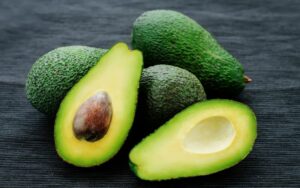Avocados, often referred to as “alligator pears,” are renowned for their creamy texture, distinctive bumpy skin, and delicious taste. This versatile fruit is a beloved culinary ingredient across various cultures, playing a starring role in iconic dishes like guacamole or simply enjoyed on its own. Botanically classified as a fruit with a large berry and single center pit, avocados originate from the Persea americana tree and are believed to have originated in Mexico or Central America, with Mexico being the primary global producer.
Avocado Nutrition – The Rich Nutritional Profile of Avocados
Avocados have earned their reputation as a superfood due to their impressive nutritional content, making them a valuable addition to any healthy meal plan. They are a remarkable source of fiber and contain a higher percentage of healthy fats (monounsaturated fats) compared to carbohydrates. This makes them particularly popular in lower-carbohydrate diets, including those for individuals with diabetes.
The heart-friendly fats in avocados do not raise blood cholesterol levels, making them satisfying and suitable for traditional cholesterol-lowering diets that often require low-fat and low-cholesterol options. As one of the highest-fat plant foods available, avocados are a favored choice among vegans and vegetarians. The slightly earthy yet neutral flavor of avocados blends seamlessly in sauces, dressings, sandwiches, baked goods, salads, and grain-based dishes, adding a delightful richness.
Incorporating avocados into your diet provides a plethora of essential nutrients, such as potassium, vitamins K, C, E, and B-6, along with folate and magnesium. These nutrients play essential roles in maintaining overall health, supporting the immune system, and promoting healthy skin and vision. Whether you’re looking to boost your avocado nutrition or simply savor the scrumptious taste, these green gems offer a wide range of benefits to enhance your well-being. So, go ahead, indulge in the goodness of avocados and relish their rich flavor in every bite!
Avocado Nutrition Facts
Let’s take a closer look at the key nutrients components in avocados:
| Nutrient | Amount per Medium Avocado (200g) |
|---|---|
| Calories | 322 |
| Carbohydrates | 17g |
| Fiber | 13.4g |
| Sugars | <1g |
| Protein | 4g |
| Total Fat | 30g |
| Saturated Fat | 4.2g |
| Monounsaturated Fat | 19.7g |
| Polyunsaturated Fat | 3.6g |
| Sodium | 14mg |
| Magnesium | 58mg |
| Potassium | 708mg |
| Vitamin C | 20mg |
| Vitamin E | 4.6mg |
| Vitamin K | 21mcg |
Source: Harvard T.H. Chan School of Public Health
Avocados are an excellent source of various essential nutrients, including potassium, magnesium, and vitamins C, E, and K. They are also a good source of B vitamins, including folate, which is important for cell division and supports fetal development during pregnancy.

Health Benefits of Avocado Consumption
1. Cardiovascular Health
The monounsaturated fats in avocados have been associated with improved heart health. These fats may help lower LDL cholesterol levels and reduce the risk of cardiovascular disease.
2. Blood Sugar Management
Avocados have a low glycemic index, meaning they have a minimal impact on blood sugar levels. Including avocados in meals can help stabilize blood sugar and support diabetes management.
3. Weight Management
Despite their calorie and fat content, avocados can contribute to weight management. The fiber and healthy fats in avocados promote feelings of fullness and satisfaction, potentially reducing overall calorie intake.
4. Eye Health
Avocados contain carotenoids, such as lutein and zeaxanthin, which are beneficial for eye health and may reduce the risk of age-related macular degeneration.
5. Promote Weight Loss
The combination of fiber and healthy fats in avocados may promote weight loss by increasing feelings of fullness and reducing overall calorie consumption. Studies have shown a positive association between avocado consumption and lower body weight and BMI.
6. Lower Metabolic Syndrome Risk
Research suggests that avocado consumption is associated with a lower risk of metabolic syndrome. The nutrients in avocados, such as monounsaturated fats, fiber, and potassium, may play a role in improving metabolic health.
7. Seed Extract May Help Prevent Cancer
Avocado seed extract has been found to be rich in sterol compounds that may have potential cancer-protective properties. However, it is important to note that avocado growers do not recommend eating the seed.
8. Reduce Cardiovascular Disease Risk
Avocado consumption has been linked to higher levels of HDL cholesterol, which is associated with a reduced risk of cardiovascular disease. Including avocados in a heart-healthy diet can contribute to better cardiovascular health.
9. Aid in Diabetes Management
Due to their low glycemic index and beneficial effects on blood sugar levels, avocados can be a beneficial addition to the diet of individuals with diabetes. Studies have shown that avocado consumption improved glycemic control in subjects with type 2 diabetes.

Avocados and Belly Fat
Do avocados burn belly fat?
While avocados don’t specifically “burn” belly fat, they can be a valuable addition to a balanced diet that supports weight management. The combination of healthy fats, fiber, and nutrients in avocados may help reduce overall calorie intake and promote feelings of fullness, which can contribute to weight loss, including in the abdominal area.
Avocado Nutrition – Including Avocados in Your Diet
Avocados are incredibly versatile and can be enjoyed in a variety of ways:
- Sliced and added to salads or sandwiches
- Blended into smoothies for a creamy texture
- Mashed as a spread on toast or as a guacamole dip
- Used as a substitute for butter or oil in baking
Conclusion
Avocados are a true nutritional powerhouse, offering an array of health benefits due to their impressive nutritional profile. With their heart-healthy fats, fiber, vitamins, and minerals, avocados are a delicious and nutritious addition to any diet. Whether you’re aiming to support heart health, manage blood sugar levels, promote weight management, or simply enjoy their delightful taste and texture, avocados are a valuable and versatile fruit to include in your daily meals.




